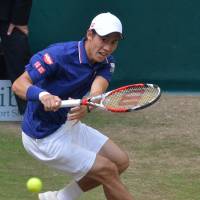Kei Nishikori's withdrawal from Wimbledon during his fourth-round match with Marin Cilic due to a rib injury was unfortunate. It marked the second year in a row the world No. 6 was forced to pull out of the classic at the All-England Club due to a physical problem.
With Nishikori's appearance in the 2014 U.S. Open final, where he lost to Cilic, almost two years behind him, the Shimane native has not been able to recapture the magic that took him to his greatest glory. Nishikori has played in seven Grand Slams since then, but has not advanced to the semifinals of even one of them.
Nobody has ever questioned Nishikori's heart or fitness, but one has to wonder if it's just a matter of physiology. He has incurred a fair amount of injuries during his career, but always battled back.
To win a Grand Slam a player has to prevail in seven matches against the top talent in the world in sometimes difficult conditions. It's no easy task for even the elite. The reality is that Nishikori's body just may not be built for all the wear and tear it has to endure.
I asked Nishikori about his physical challenges a few months before his run to the final in Flushing Meadows a couple of years ago.
"The Tour is very tough," Nishikori said. "You can't get much time to train and rest. I have to take care of my body. When you play top guys you have to play very intense games and your body gets more damage. I think I am getting a lot of experience playing those guys, so hopefully I will have fewer injuries."
It hasn't worked out that way so far. At 26, Nishikori still has time, but he is in a window now where every Grand Slam that goes by is an opportunity lost.
Wasting time: ESPN reported Sunday night that Boston Red Sox relief pitcher Junichi Tazawa is the slowest in the major leagues in pace — the time between pitches. Tazawa takes a staggering 30.3 seconds per pitch.
I could only laugh when I heard MLB was installing a 30-second time clock this season for visits to the mound by managers and pitching coaches. Pitching changes and strategy sessions do take time, but anybody who watches MLB games these days could tell you the ridiculous amount of time taken between pitches by both starters and relievers is what is making the games run so long.
Stepping off the mound, going to the rosin bag, etc., makes it difficult for even the most ardent fan to stay engaged.
Rule 8.04 requires an MLB pitcher to deliver the ball to the batter within 12 seconds after he receives it with the bases unoccupied. The penalty is supposed to be a ball. However, this is obviously rarely enforced.
One surefire way to end the inexorable wait for pitches would be to install a 15-second clock. Every time the pitcher doesn't start his windup before time expires, the pitch is a ball.
Home headliners: With a Junior Grand Prix set for Yokohama next month, here's hoping that defending world junior champion Marin Honda and rising star Yuna Shiraiwa will be tapped to represent the host country.
The Japan Skating Federation said last week that the assignments for the JGP season would be decided following a board meeting later this month.
Too soon: The Sunwolves took another battering in Super Rugby action over the weekend, losing to the Bulls 50-3 in Pretoria. The Japan side now has a record of 1-12-1 in its inaugural season.
With coach Mark Hammett having already announced his resignation, and the poor record the team has posted, one has to wonder if the hurry to get a Japan team into the competition this season was a mistake.
With the Rugby World Cup still more than three years away, was there really a reason to rush to get a Japan team into Super Rugby?
I think not.
The Rugby World Cup will stand on its own merits. Trying to give Japanese fans artificial incentive to get interested in the sport is not the right approach.



















With your current subscription plan you can comment on stories. However, before writing your first comment, please create a display name in the Profile section of your subscriber account page.